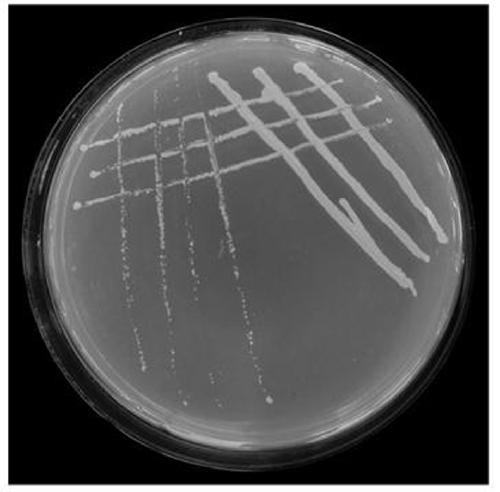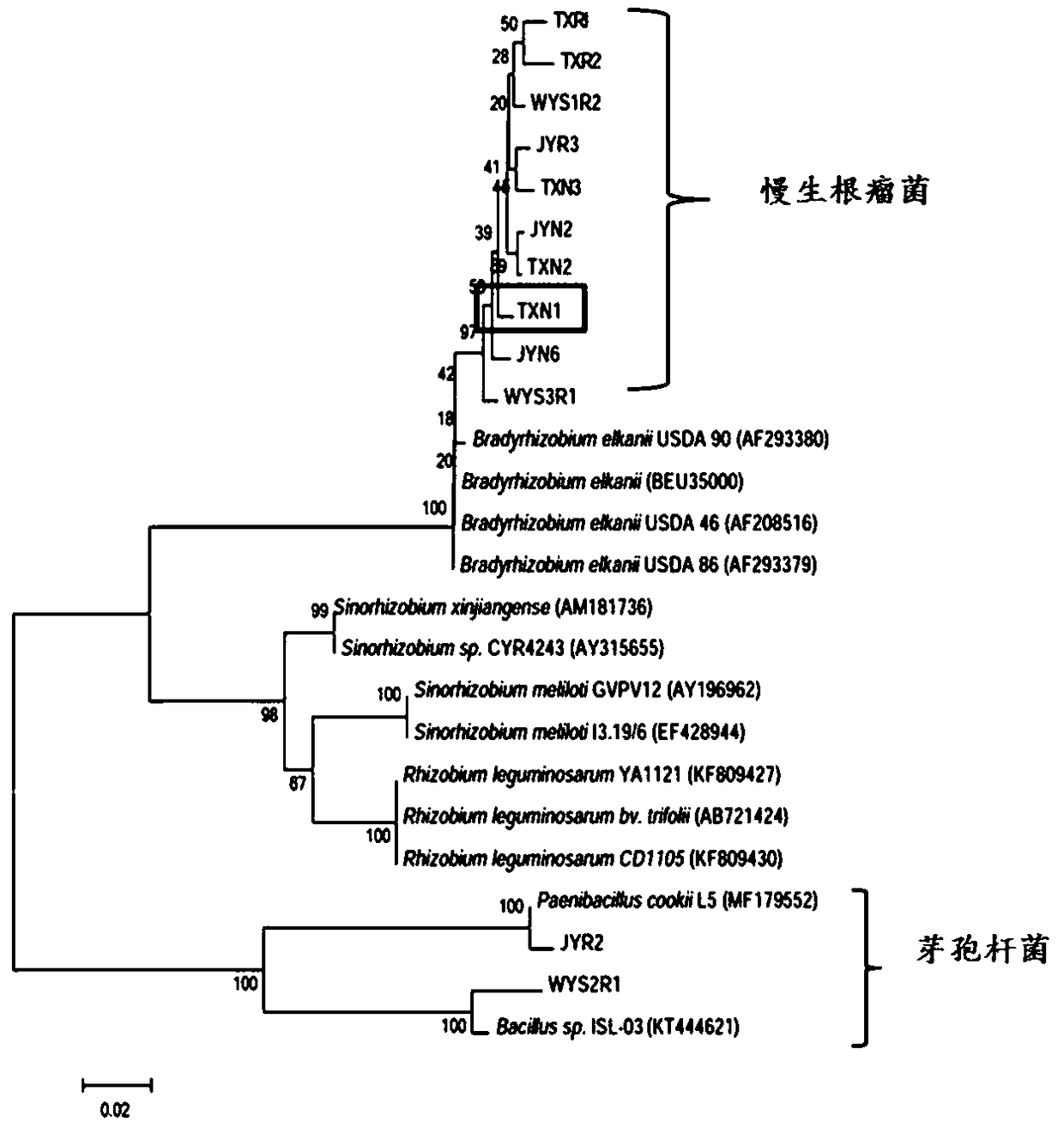Cassia rhizobium strain TXN1 and application thereof
A technology of TXN1 and Cassia, which is applied in the field of microorganisms, can solve the problems of affecting planting and popularization, low nitrogen fixation efficiency, and slow nodulation, etc., and achieves the effects of strong nitrogen fixation ability, increased total nitrogen content, and high nodulation rate
- Summary
- Abstract
- Description
- Claims
- Application Information
AI Technical Summary
Problems solved by technology
Method used
Image
Examples
Embodiment 1
[0044] Example 1 Isolation and Purification of Rhizobium TXN1
[0045] 1 Isolation of rhizobia
[0046] Take fresh, mature and large nodules of Cassia pinnata, rinse them with water, and dry the surface moisture with filter paper. Put it in 95% (w / v) ethanol for 3-5 minutes, take it out and rinse it with sterile water for 5-6 times, then put it in 0.1% (w / v) HgCl 2 Sterilize for 3-5 minutes, take it out and rinse with sterile water 5-6 times. Then cut in half on a flame-sterilized glass slide, clamp half of the tumor with sterile tweezers, make the incision face the surface of YMA (Table 1) culture medium, and incubate at 28°C after being upside down.
[0047] 2 purification
[0048] After the growth of bacteria, a small amount of rhizobia colonies were scraped from the plate with the tip of a pipette, diluted with 1 mL of sterile water, and streaked on the plate for culture again. After 3 days, the colonies were observed until 15 days (slow Rhizobia need 7-15 days to app...
Embodiment 2
[0054] Example 2 Identification of 16S rDNA Molecular Biology of Rhizobium TXN1
[0055] Perform PCR-specific amplification of 16S rDNA on rhizobia monoclonal liquid, and the forward primer is SEQ ID NO.3: V4V5515 -F 5'-GTGCCAGCMGCCGCGGTAA-3'; the reverse primer is SEQ ID NO.4: V4V5907 -R 5'-CCGTCAATTCCTTTGAGTTT-3'. The enzyme is 2×star Mix. The PCR amplification products were detected by electrophoresis imaging technology to observe whether they had bands, and the remaining PCR amplification products were used for sequence determination. The sequencing result is shown in SEQ ID NO:5. The PCR reaction system is shown in Table 4.
[0056] Table 416S rDNA2×starMix enzyme reaction system
[0057]
[0058] Reaction conditions: 95°C for 5 min; (95°C for 20 s, 55°C for 20 s, 72°C for 50 s)×44 cycle; 70°C for 5 min.
[0059] Obtain 13 reference strain sequences from the NCBI (GenBank) database, use the software BioEdit and MEGA6 to analyze the 16S rDNA partial sequences of...
Embodiment 3
[0060] Example 3 Tieback test
[0061] The purpose of the experiment: to screen out the nitrogen-fixing bacteria rhizobia that have high binding efficiency and strong nitrogen-fixing ability with Cassia forage.
[0062] Test materials: Test plant: Minyu No. 1 Cassia round leaves; Test strain: isolated and purified nitrogen-fixing bacteria rhizobium.
[0063] Main test instruments and equipment: artificial climate growth chamber, ultra-clean workbench, high-pressure sterilization pot, constant temperature incubator, 25 potted pots of 15×15 cm, 2 beakers of 1 L, tweezers, Petri dishes, filter paper, glass Sticks, scissors and gauze etc.
[0064] Test Drugs and Reagents
[0065] (1) Test drugs: mannitol, MgSO 4 ∙7H 2 O, NaCl, yeast powder, K 2 HPO 4 、KH 2 PO 4 , CaCO 3 , Ca(NO 3 ) 2 ∙4H 2 O, MgSO 4 ·7H 2 O, CaCl 2 2H 2 O, Na 2 HPO 4 12H 2 O, C 10 h 12 N 2 o 8 FeNa·3H 2 O, Na 2 MoO 4 , MnSO 4 、H 3 BO 3 、CuSO 4 ·5H 2 O and ZnSO 4 ·7H 2 O.
[0066] ...
PUM
 Login to View More
Login to View More Abstract
Description
Claims
Application Information
 Login to View More
Login to View More - R&D
- Intellectual Property
- Life Sciences
- Materials
- Tech Scout
- Unparalleled Data Quality
- Higher Quality Content
- 60% Fewer Hallucinations
Browse by: Latest US Patents, China's latest patents, Technical Efficacy Thesaurus, Application Domain, Technology Topic, Popular Technical Reports.
© 2025 PatSnap. All rights reserved.Legal|Privacy policy|Modern Slavery Act Transparency Statement|Sitemap|About US| Contact US: help@patsnap.com



